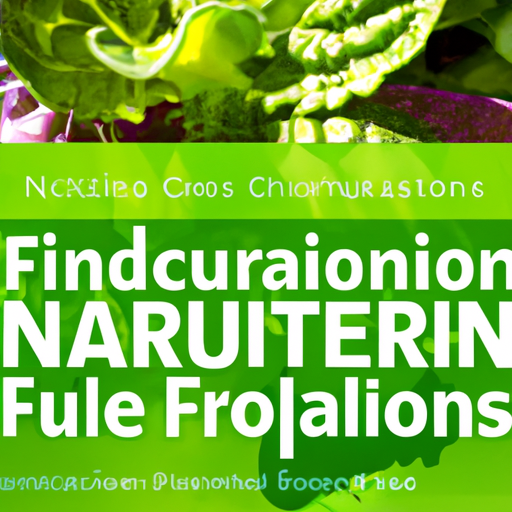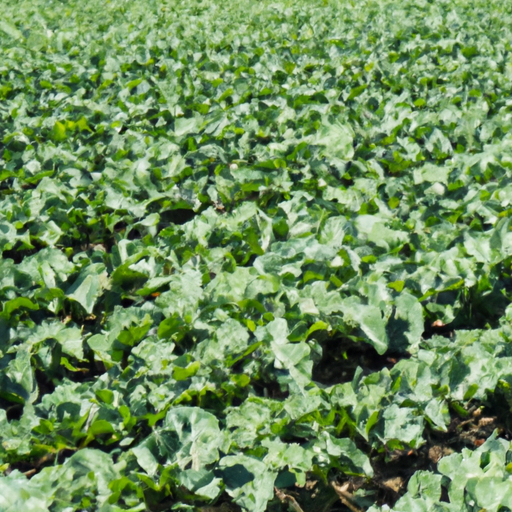Imagine a world where lush green gardens thrive amidst concrete jungles, where crops flourish without soil, and fish swim gracefully alongside flourishing plants. Welcome to the realm of hydroponics and aquaponics, where innovative thinkers are revolutionizing agriculture as we know it. In this article, we explore how these pioneering techniques are reshaping the landscape of food production, providing sustainable solutions to the ever-growing global demand. Join us on this extraordinary journey, as we unravel the fertile innovations that are cultivating a greener tomorrow.
Revolutionizing Agriculture: Exploring the Potential of Hydroponics
Amidst the traditional methods of farming, a brilliant innovation has emerged to reshape the future of agriculture – hydroponics. Leveraging advancements in technology, hydroponics has opened up boundless possibilities for sustainable crop cultivation. This revolutionary technique eliminates the need for soil, allowing plants to thrive solely on nutrient-rich water. Here, we delve into the untapped potential of hydroponics and its transformative impact on the way we grow food.
One undeniable advantage of hydroponics lies in its space-saving nature. Unlike conventional farming, this method can be practiced in compact indoor settings, giving rise to vertical farming. By vertically stacking plant beds, farmers can maximize productivity per square foot, making it a game-changer for urban agriculture. Imagine lush green walls of leafy greens, herbs, and even fruit flourishing in high-rise buildings, reducing the strain on rural farmlands and dramatically reducing transportation costs.
Aquaponics: An Eco-Friendly Fusion of Aquaculture and Hydroponics
Imagine a revolutionary agricultural method that harnesses the power of nature, marrying the principles of aquaculture and hydroponics. Aquaponics is this extraordinary fusion, an eco-friendly system that presents a sustainable and innovative solution to modern food production challenges. By eliminating the need for chemical fertilizers, conserving water resources, and promoting the well-being of aquatic organisms, aquaponics has the potential to reshape the agricultural landscape.
In this harmonious environment, fish and plants coexist in perfect synergy. The process begins as fish waste releases valuable nutrients into the water. These nutrients, rich in nitrogen and other essential elements, serve as a natural fertilizer for plants. The plants, in turn, filter the water, removing toxins and providing a clean habitat for the fish. This mutually beneficial relationship ensures optimal growth for both aquatic life and crops.
- Resource efficiency: Aquaponics utilizes approximately 90% less water compared to traditional farming methods, making it a remarkably sustainable approach.
- Organic produce: With the absence of chemical fertilizers and pesticides, aquaponics produces fresh and healthy fruits, vegetables, and herbs, free from harmful contaminants.
- Diverse possibilities: From leafy greens to a variety of herbs, flowers, and even certain fruiting plants, aquaponics offers endless possibilities for cultivating different crops.
By embracing the harmony between fish, plants, and water, aquaponics showcases a harmonious collaboration found in nature, transforming the way we grow our food while safeguarding the environment. With its eco-friendly benefits and potential for creative cultivation, this sustainable fusion holds the promise of a greener and healthier future.
Unlocking the Secrets of Hydroponic and Aquaponic Farming: Key Considerations for Successful Implementation
Choosing the right system:
- Consider the available space and resources when deciding between hydroponic and aquaponic farming systems. Hydroponics utilizes nutrient-rich water solutions, while aquaponics integrates fish waste to provide the necessary nutrients for plant growth.
- Research the different types of hydroponic and aquaponic systems, such as nutrient film technique (NFT), deep water culture (DWC), or media-based systems. Each system has its advantages and optimal applications, so understanding which one suits your needs is crucial.
- Take into account the scalability and complexity of the system. Some systems are better suited for small-scale operations, while others can accommodate larger and more complex setups.
Managing nutrient levels and pH:
Monitoring and maintaining proper nutrient levels and pH is essential for the success of any hydroponic or aquaponic farm. Consider the following:
- Nutrient testing: Regularly test the nutrient levels in your system to ensure plants receive the correct balance of macronutrients and micronutrients.
- pH monitoring: Maintain a stable pH level within the optimal range for your chosen crops. Different plants have varying pH preferences, so adjust accordingly.
- Nutrient supplementation: Depending on the specific requirements of your crops, you may need to supplement the nutrient solution with additional elements such as calcium, magnesium, or iron.
- Water quality: Ensure the water source used in your system is clean and free from contaminants, as this can affect nutrient absorption and overall plant health.
Final Thoughts
In an era marked by dwindling resources and a growing global population, the agricultural industry finds itself at a turning point. Traditional farming methods are struggling to keep pace with the ever-increasing demands for food production. However, amidst this challenge, hydroponics and aquaponics have emerged as brilliant pioneers, reshaping the landscape of agriculture. These fertile innovations prove that transcendence lies not only in embracing new technologies but also in reimagining the very essence of how we grow food.
As we delve further into the realm of hydroponics, we tap into an unparalleled level of control and efficiency. No longer bound by the constraints of soil, farmers can cultivate crops in nutrient-rich water, optimizing resource allocation and significantly reducing water usage. Gone are the days of relying on unpredictable weather patterns or harsh climates; plants are nurtured in carefully calibrated environments, ensuring year-round productivity and consistent harvests. The verticality of hydroponics further revolutionizes space utilization, defying traditional agriculture’s limitations and turning even the most confined urban areas into bountiful gardens.
Concurrently, aquaponics presents a harmonious marriage between hydroponics and aquaculture. By integrating fish farming with plant cultivation, this ingenious system creates a self-sustaining ecosystem where each component thrives from the other. While the fish excrete waste, it becomes a valuable source of nutrients for the plants. In turn, the plants purify the water for the fish, creating a mutually beneficial relationship that guarantees a constant supply of fresh produce and healthy, thriving aquatic life. This regenerative approach revolutionizes the farming industry, promoting sustainability, and heralding a new era of conscious agriculture.
The potential of hydroponics and aquaponics extends far beyond the confines of traditional farming. These technologies carry the promise of transforming desolate landscapes, enabling us to reclaim arid lands and make them thrive with flourishing plant life. From barren deserts to inhospitable mountain ranges, these innovations transcend geographical boundaries and unlock the potential for new agricultural frontiers.
By embracing hydroponics and aquaponics, we embrace a future where agriculture coexists in perfect harmony with the environment. In this future, we reimagine farming as an art form, a symphony of technology and nature that orchestrates sustainable food production while preserving our fragile ecosystems. The pioneers of hydroponics and aquaponics are leading the charge towards this future, revolutionizing agriculture one ingenious system at a time.
As we bid farewell to the traditional methods of farming, let us welcome these fertile innovations with open arms. The journey towards a sustainable, efficient, and flourishing agricultural future begins now, with hydroponics and aquaponics at the forefront of this transformative wave. It is time for us to cultivate a symbiotic relationship with nature, as we venture into a realm where the boundaries of possibility are shattered, and a new era of agriculture emerges, nourishing both our bodies and our planet.
In terms of traditional agricultural practices, the field of hydroponics & aquaponics offers an innovational breakthrough with their incorporation of aquatic processes. Hydroponics, which facilitates the growth of plants without the need for soil, utilizes a water-based nutrient delivery system to nourish the plants’ roots. Aquaponics adds a layer of complexity to the equation, activating an eco-system approach wherein fish waste supports growth of a whole array of crops. This union of processes that often inhabit opposing aquatic environments offers a new, sustainable way to grow food.
Leading the charge in this area is Fertile Innovations, a company specializing in hydroponics & aquaponics. They provide gardening systems for open-loop, closed-loop agriculture, offering a comprehensive hydroponic gardening solution. Fertile Innovations’ products are a perfect tool for local urban farmers, as they are designed to be easily installed, requiring no significant groundwork or infrastructure. All of the company’s systems are self-contained, requiring only the necessary water, nutrients and oxygen inputs.
The benefits that hydroponics & aquaponics offer to traditional agriculture are numerous. First and foremost, they decrease the amount of fresh water needed to grow plants. Given the current global need for water, this creates an invaluable opportunity to provide a sustainable, more recirculated approach to agricultural production. Additionally, since plants are free to send their roots to search for nutrients, their growth rates can be significantly accelerated. This allows a larger harvest in a shorter period of time. When combined, these factors create a significantly more efficient and less costly agricultrual method.
Food security and sustianability are two of the most crucial issues facing our planet today. Fertile Innovations provides the agricultural industry with the tools to help tackle these pressing issues. Through their creative and innovative approach to hydroponics & aquaponics, they are paving the way for a new era of sustainable production.



